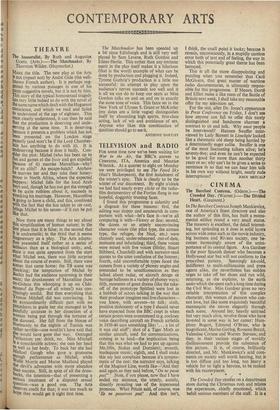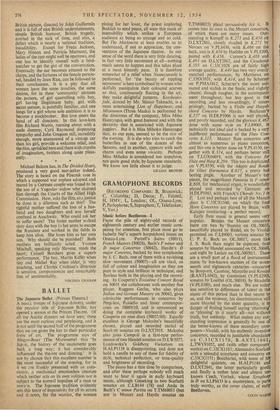CINEMA
The Barefoot Contessa. (Odeon.)—The Crowded Day. (Wamer.)—The Divided Heart. (Gaumont.)
IN The Barefoot Contessa Joseph Mankiewicz, one of America's finest directors and also the author of this film, has built a monu- mental edifice round a very small statue. The masonry is excellent, the detail interest- ing, but spreading as it does in solid layers across wide areas such as the movie industry, big business and Riviera society, one be- comes increasingly aware of the unim- portance of its central figure. Ava Gardner is the poor Spanish dancer who becomes a Hollywood star but will not conform to the prescribed pattern. Seemingly ice-cold, mdifferent to multi-millionaires and press agents alike, she nevertheless has sudden urges to take off her shoes and run wild, returning, as she explains, to the earth under which she spent such a long time during the Civil War. Miss Gardner gives no very reliable interpretation of this complex character, this woman of passion who can- not love, but like some exquisitely beautiful mannequin she moves elegantly through each scene. Around her, heavily satirised but very much alive, revolve those who have invested in some way in her career: Hum- phrey Bogart, Edmond O'Brien, who is magnificent, Marius Goring, Rossano Brazzl, Valentine Cortese and Warren Stevens; and they, in their various stages of worldly disillusionment provide the substance of this picture. It is, of course, brilliantly directed, and Mr. Mankiewicz's acid com- ments on society well worth hearing, but it is too diffuse and too long, too heavy a vehicle for so light a heroine, to be ranked with his masterpieces.
The Crowded Day centres on a department store during the Christmas rush and relates the experiences, chiefly emotional, which befall various members of the staff. It is a British picture, directed by John Guillermin and it is full of nice British understatements, simple British humour, British tragedy, averted in the nick of time, and alas, a defect which is nearly a national tradition, inaudibility. Except for Freda Jackson, Mary Hinton and Patricia. Marmont, the ladies of the cast might well be sparrows, and one has to identify oneself with a bird- watcher to get the gist of the conversation. Eventually the ear becomes attuned to the chirps, and the fortunes of the female person- nel, headed by Joan Rice, can be followed to their conclusions. It is a pity that all women have the same troubles, the same desires, for in these 'community' pictures the pattern, of girl quarrelling with boy, girl having illegitimate baby, girl with secret sorrow, is painfully familiar, and one longs for a girl whose sole ambition it is to become a stockbroker. But love steers the hand of all directors. In this love-lorn film Richard Wattis, running about with a nude dummy, Cyril Raymond dispensing sympathy and John Gregson still, incredibly enough, more enamoured of a vintage car than his girl, provide a welcome relief, and the film, sprinkled here and there with crumbs of imagination, twitters along quite pleas- antly.
Michael Balcon has, in The Divided Heart, produced a very good tear-jerker indeed. The story is based on the Pirecnik case in which a supposed war orphan adopted and reared by a German couple was found to be the son of a Yugoslav widow who claimed him through the Courts of the Allied High Commission. How, asks the film, caa justice be done in a dilemma such as this? The rightful mother suffered the loss of a hus- band and two daughters and was herself confined in Auschwitz. Who could ask her to suffer more? The foster mother walked sixty days with the boy ii her arms to escape the Russians and worked in the fields to keep him alive. She loves him as her own son. Why should she be punished? Both mothers are brilliantly acted. Yvonne Mitchell, speaking only Slovene, rends the heart; Cornell Borchers gives a superb performance. The boy, Martin Keller when tiny and Michel Ray when older, is very touching, and Charles Crichton's direction is sensitive, compassionate and remarkably free of sentimentality.
VIRGINIA GRAHAM



































 Previous page
Previous page